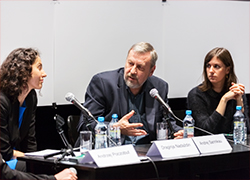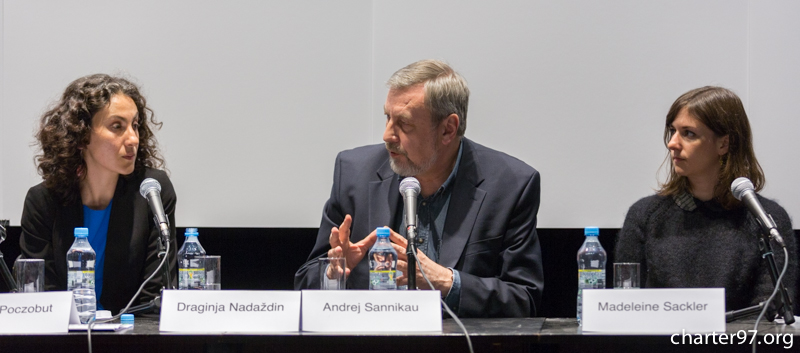Andrei Sannikov: IIHF responsible for repression in Belarus
5- 13.05.2014, 6:58
- 19,799

Strengthening repression in Belarus is directly connected with the holding of the Ice Hockey World Championship.
The film Dangerous Acts Starring the Unstable Elements of Belarus was shown in Warsaw. The event was organised by Amnesty International as part of Planete+ Doc Film Festival in the Polish capital. The HBO documentary, which tells about the situation in Belarus and the underground Free Theatre, was screened in Kinoteka cinema in Warsaw's Palace of Culture and Science.
The film was followed by a discussion of the events in Belarus and Ukraine. Andrei Sannikov, the leader of European Belarus civil campaign and 2010 presidential candidate, documentary director Madeleine Sackler, journalist Andrzej Poczobut, director of Amnesty International Poland Draginja Nadaždin took part in the discussion. Belarusian opposition activists, Free Theatre actors, journalists, human rights activists from Belarus, Russia and Poland attended the screening.
Madeleine Sackler, the director Dangerous Acts Starring the Unstable Elements of Belarus, said how the film had been made.
She says she met the Belarus Free Theatre in June 2012 and decided to make a film about it. The shooting process took 3.5 years, and 450 hours were shot. According to Madeleine, it was a considered decision to give real names of all heroes and the people involved in the film in the credits, but the camera operator wanted to remain incognito, as she had accreditation and had the right to film rallies. The shooting process was coordinated via Skype. The camerawoman carried the shot material over the border once in three or four months and sent it to Madeline by mail. The premiere took place in Toronto last September. The film will be shown in New York and Washington in June, Madeleine Sackler says.
Journalist and former political prisoner Andrzej Poczobut reminded the audience about spreading Lukashism to neighbouring countries – Russia and Ukraine.
“The film gives a good understanding of the atmosphere in Belarus. The authorities themselves turned the Free Theare into their formidable enemy. Lukashenka, who came to power in 1994, was not regarded as something serious at the beginning. All expected the economic collapse of Belarus in two years and the removal of Lukashenka from power. But 20 years passed, and the project he launched in 1994 appeared to be attractive not only for Belarus. If we look at the current events in eastern Ukraine, we see that Lukashenka's project and his authoritarianism seem to be attractive for a part of society.
The Belarusian ruler was the first case when the politician with anti-democratic slogans and criticism of the West came to power in the former Soviet Union. Russia was ruled by Boris Yeltsin at that time and had free media. Ukraine changed authorities several times, but Lukashenka has been ruling Belarus and feels good. His plan was to create a new Soviet Union, and he started to implement it in 1994. This big project failed, but if we look at the behaviour of Vladimir Putin today, we can say that he has learnt a lot from Lukashenka.
I think it is the reason for a closer look at Belarus. Among all former Soviet countries, Belarus has moved farther in establishing the new authoritarian order that may become an alternative to the western democracy. If the pro-Russian forces had won in Ukraine, it would look like today's Belarus.
Lukashenka has been treating his opponents brutally making a show of it for these years, and Andrei Sannikov has leanrt it by his own experience. But everything has its beginning and end, though he has been in power for 20 years. So, we will see the end of Lukashenka's rule,” Andrzej Poczobut said.
Belarusian presidential candidate Andrei Sannikov spoke about the situation in the country due to the holding of the Ice Hockey World Championship.
“Unfortunately, the situation is not improving,” Andrei Sannikov said. “We cannot but remember that repression has toughened on a new scale, especially because of the ice hockey championship. In addition to nine political prisoners, 32 people were thrown behind bars. It's impossible not to think about Zmitser Dashkevich, who was released and then thrown into jail again for no reason; about Aliaksandr Frantskevich, a former political prisoner, who has been jailed again; about Maksim Viniarski, who was on hunger strike, also on dry hunger strike, for 12 days. We can also recall that MEP Marek Migalski, who insisted on moving the championship to another country, was not allowed to enter Belarus. Migalski's initiative was supported by many politicians, public figures, actors and human rights defenders. They appealed directly to the president of the International Ice Hockey Federation. We should declare the IIHF and its president Rene Fasel responsible for what is happening in Belarus. It's absolutely obvious that latest events are directly connected with the championship in Minsk.”
The leader of European Belarus civil campaign answered questions of the audience. One of them was whether the Belarusians were ready for protests and if society supported Lukashenka.
“The Belarusians protested against the dictatorship. What happened in Minsk in 2010, on Independence Square in Kyiv and on Bolotnaya Square in Moscow are links in the same chain. The dictatorial and authoritarian regimes do not leave communication channels. They just eliminate the opposition, civil society and media. People have to protest and demonstrate their discontent. Lukashenka doesn't have any support. It was absolutely obvious during the 2010 presidential election. Today, we need to speak not about the support of the dictator, but about what we can do to end the dictatorship,” Andrei Sannikov said.
The audience asked about Ukraine and how Poland could influence the situation of its eastern neighbour.
“We should speak not about Poland alone, but about Europe. Ukraine cannot withstand without Europe's help. The events in Ukraine highlighted the problems that existed in the European policy towards Belarus. We need to think today how to preserve the European democratic values. It can be done only by resisting Russia's aggression in Ukraine and by struggling against the dictatorship in Belarus. Ukraine won't survive without democratic Belarus,” Andrei Sannikov notes.
The movie will be screened again at Kinoteka Cinema in Warsaw's Palace of Culture (1 Defilad Sq) at 18:00 on May 13.















